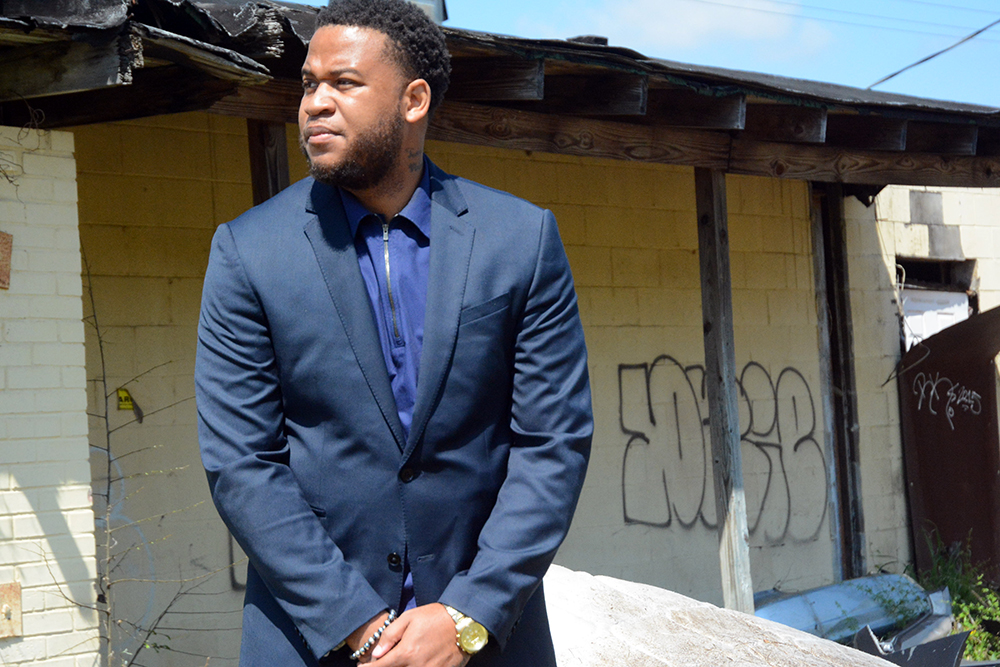
Photos by Justin Vicory
“In my neighborhood, if you made it past 18 you were blessed,” says educator, author and motivational speaker Tommie Mabry, 31, standing beneath an overpass in the midtown Jackson, Miss., community where he became street smart and a juvenile offender at the age of 12.
JACKSON, Miss. — Tommie Mabry was 12 when a bullet grazed him while he was burglarizing a home he thought was empty. It could have been fatal for the rebellious preteen hell-bent on emulating the people in the midtown area of Jackson, where he grew up.
“We modeled what we saw. What was cool to me were the guys that were getting all the attention. Those were either rappers, athletes or drug dealers. I wanted to be that,” said Mabry, an author and motivational speaker working on his Ph.D. in higher education at Jackson State University.
The problem with an increasing rate of gun violence and incarceration among juveniles is their repeated exposure to negative influences, he said.
“There is not much reform going on in our neighborhoods and what our kids are subjected to. They are just playing the hands they are dealt,” he said. “Children growing up in a model neighborhood will probably never see the jail system. However, if you take children in an environment where poverty is high and during a simple walk to school they encounter negative influences daily, they are going to be a product of that environment.”
[Related: Youth Caught in Crosshairs of Cycles of Gun Violence. Is Anybody Listening?]
Mabry was quickly becoming just that as a child. He was shot twice, arrested once, expelled from seven elementary schools and three middle schools, and repeated eighth grade before eventually changing course.
In 2013, he self-published “A Dark Journey to a Light Future” through WestBow Press about his life. He describes his book as the true story of an African-American child destined by God but fighting against his violent and discouraging surroundings to walk in the path of greatness.
His second book “If Tommie Can Do It, We Can Do it,” self-published in 2015, is the middle-school version of his story. “I wanted to reach the younger kids, but the first book was too complex,” said Mabry, who this year released a K-5 version called “Little Tommie’s Four B’s.”
In 2015, he founded Tommie Mabry Co., an educational and motivational speaking platform, and in 2016 the John Maxwell leadership and training program company recognized him as one of the country’s Top 30 leadership coaches.
‘If you lived past 18, you were blessed’
One of six siblings — five boys and one girl — Mabry, 31, is the first in his family to graduate from high school and college, accomplishments that almost eluded him.
“I would take what I learned in the neighborhood and take it to the schoolhouse. I thought I really couldn’t read and write growing up, so I would act out in class as a defense mechanism. Who is going to call on the student that is always disrupting class?” asked Mabry.
Calvin Lockett, deputy superintendent of operations for Jackson Public Schools, was once Mabry’s principal at Bailey Magnet School. Also a product of the inner city, Lockett said his former student’s behavior was survival. “You had to be strong in order to survive the area he was from,” he said.
Mabry’s physical appearance still exudes toughness. Tattoos peek from beneath his crisp button-down shirt. He got his first one at 11 and now more than 70 cover his physique. The gold that crowned his two front teeth since age 13 were removed in 2011 when Mabry’s church, New Jerusalem in Jackson, and pastor Dwayne Pickett paid to have them removed.
“I just saw him make the decision that he wanted something different. He wanted to be something different,” Pickett said.
It was time to let the old Tommie go, Mabry said. The old him was a fifth grader arrested for breaking into the state fairgrounds. He recalls the judge telling him he would be deceased or locked up within five years. It took several more years before he would make changes in his life.
“When I repeated eighth grade, that was my turning point,” he said.
Finally, the light Lockett said he always saw in Mabry was beginning to shine through.
Mabry credits God for bringing people into his life, like the late Jackson Mayor Chokwe Lumumba who placed him on his AAU basketball team. “He saw something that I was not before I was. He saw in me something that I could be. … He said he wanted to expose me to some things I hadn’t seen. That’s the key; giving kids exposure to positivity. Giving kids hope.”
Interacting with student ballplayers who talked about attending the University of Mississippi, Kentucky and Duke motivated Mabry to see beyond his surroundings.
“In my neighborhood, if you made it past 18 you were blessed,” said Mabry, who began to realize he needed to shape up.
At Bailey Magnet School, he became a nationally ranked high school basketball player, vetting offers from various colleges and universities. Then, while skipping school his senior year, he was accidentally shot in the foot. A friend was dancing around with a gun in his pocket. It fell out and discharged.
Unable to play, Mabry lost his scholarship offers.

‘I broke the cycle’
Mabry says the incident was God’s way of getting his attention.
He then stumbled across the Scripture: “He that is inside of you is greater than He that is in the world.” Mabry said it taught him that to get something he’s never had, he had to do something he had never done and become a person he’d never been.
His faith was answered when Missouri State extended a scholarship contingent on Mabry attending summer school and raising his 1.8 GPA to a 2.0. In 2007, he enrolled at the college and taught himself how to study.
“They told me if I didn’t maintain a 2.0, I would be sent back to Jackson,” he said.
Eventually, Mabry transferred to the private, historically black Tougaloo College in suburban Jackson. He earned a bachelor’s degree in education with honors in 2011 and returned as an educator in the same school district that had once kicked him out.
“I felt like I was the perfect example to go back and show them that I broke the cycle,” he said.
While working at Whitten Middle School in Jackson, he met his wife, Jerrika, a speech therapist. Together they have three children. Mabry calls her his biggest supporter.
Jerrika said it’s important she give him candid feedback and encourage him to “never stop sharing his message because so many need to hear it.”
Jerrika has witnessed Mabry’s effect on children.
“They open up to him and talk about personal things, not only to him but in front of their peers. Tommie makes the environment so warm and inviting,” she said. “They feel like they can be themselves and they tell him why they’re falling asleep in class or why they’ve given up. He inspires so much hope.”
Pickett said many people relate to Mabry’s ability to rise above his circumstances and forge a new path.
In 2017, Mabry received his Master of Arts in education.
He now tours the country encouraging educators and students to analyze factors that deter academic achievement while tackling the experiences and challenges minority students face in and outside the classroom.
“I want to show them that there is no expiration date on success.”
This story was produced in conjunction with the Mississippi Center for Investigative Reporting.
It is part of the JJIE’s project on Targeting Gun Violence. Support is provided by The Kendeda Fund. The JJIE is solely responsible for the content and maintains editorial independence.































